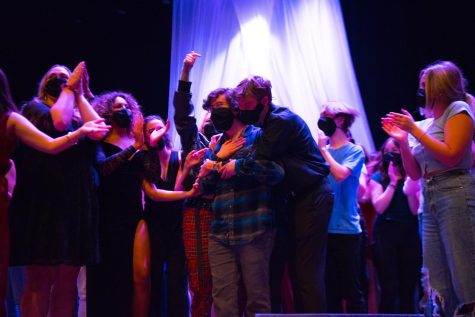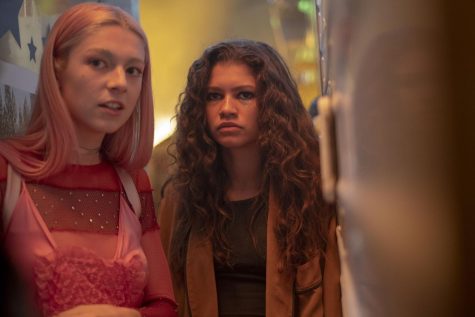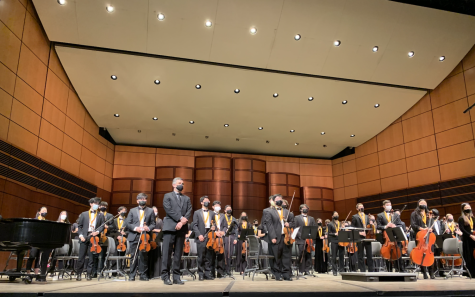‘Nomadland’–Director Zhao emphasizes the small details
Thanks to the brilliant directing of Chloè Zhao and a heart-wrenching depiction of the human journey by Frances McDormand, “Nomadland” is the newest movie to take the world by storm. The struggle of human existence portrayed in the film is deeply moving and surprisingly relatable to those of all ages.
Only weeks after its release on Hulu and in various theaters across the country, “Nomadland” has already been nominated for five Oscar categories including Best Director, Best Adapted Screenplay, Best Editing, Best Actor (Frances McDormand), and Best Picture. Furthermore, at the Golden Globes the film picked up impressive wins in the Best Motion Picture and Best Director categories. Finally, it also received a Critics’ Choice Movie Award for Best Picture.
Director Chloè Zhao is the first woman of color, first Chinese woman, and seventh woman overall to be nominated for Best Director at the Oscars. If Zhao wins, she will be the second woman ever to win that award. An inspiring role model for all aspiring female filmmakers everywhere, Zhao is making waves in the film industry, with her unique directing style and casting of nonprofessional characters like Charlene Swankie, a real life nomad who plays herself in the film.
The film follows McDormand who portrays Fern, a newcomer to the world of nomads. After losing her entire family and town, Fern decides to join the nomadic community in the United States, living full time out of her converted van. The film depicts her personal journey as well the stories of other people in the nomadic community whom Fern comes to befriend. The life of the nomads is not all easy going however, as many characters including Fern struggle with financial burdens of van repairs, medical bills, and lack of healthcare while struggling to find and maintain employment while on the road.
Personally, one of the most memorable aspects of the film was the point of view shown throughout the skilled screenplay. In many of the deeply moving scenes of obvious background noise and discussion among characters, the cameras pan out to showcase the scene through a muted perspective of blurry lens. The way the audio shifts to become more muted places the viewer in Fern’s viewpoint and her stream of consciousness. Viewers can experience being in the desert with other like-minded nomads who are talking excitedly and feel how that sound and chatter is both comforting and familiar while managing to preserve the overwhelming sensation of pervasive voices.
Another aspect of the audio that was phenomenally well done was the plethora of noises that weren’t spoken by characters, but rather from the sound of objects clinking, scraping, etc. In replacement of a typical amount of dialogue the film succeeds in telling a story through sounds that are made by the various tasks performed by Fern and her cohort. These sounds that are familiar to most people and present in everyday life, adding a coat of sensory comfort for the audience.
The film also felt incredibly authentic and relatable perhaps in part due to the nonprofessional actors that Zhao brilliantly chose or McDormand’s immaculate acting skills. The details included in the storyline, from the stomach aches and diarrhea to the soup eaten out of a can while sitting around crackling bonfires, make the raw displays of loneliness, sadness, and emptiness, as well as joy and excitement throughout the film feel so real. Even as a teenager in high school living in a small town, it is easy to relate to those deep emotions Fern and her acquaintances were experiencing.
Isolation has taken on a whole new dimension for many people in the past year. With quarantine and lack of social activities, relationships have been more difficult to form and maintain, especially with younger people who would typically be at the social peak of their lives. Not only that, but people are dealing with so much more loss currently whether it’s loss of a family member due to COVID, a job, or a relationship. Many teenagers in high school have struggled with loneliness, feeling lost, and finding a new pandemic ‘norm’ during the past year. In the film, Fern is on a similar journey experiencing very similar emotions after the loss of her husband, and the loss of a fellow nomad to cancer. So in many ways, this movie came out at a perfect time.
For those who are experiencing loss, the film is a great reminder that grief and strong emotions are not only valid, but part of the healing process. It also shows that for those who are feeling lost there are communities to be found everywhere and anywhere, all it takes is having the courage to seek those spaces out. Because of the circumstances that are present in much of the world today like quarantine and many other disruptors, people can relate to and feel validated by the many messages in “Nomadland’’ making it a must watch for everyone from teenagers to elderly folks.
To read Staff Writer Emma Pedroni-Meyer’s take on “Nomadland” click here:
‘Nomadland’ captures the gritty life outside society’s boundaries











